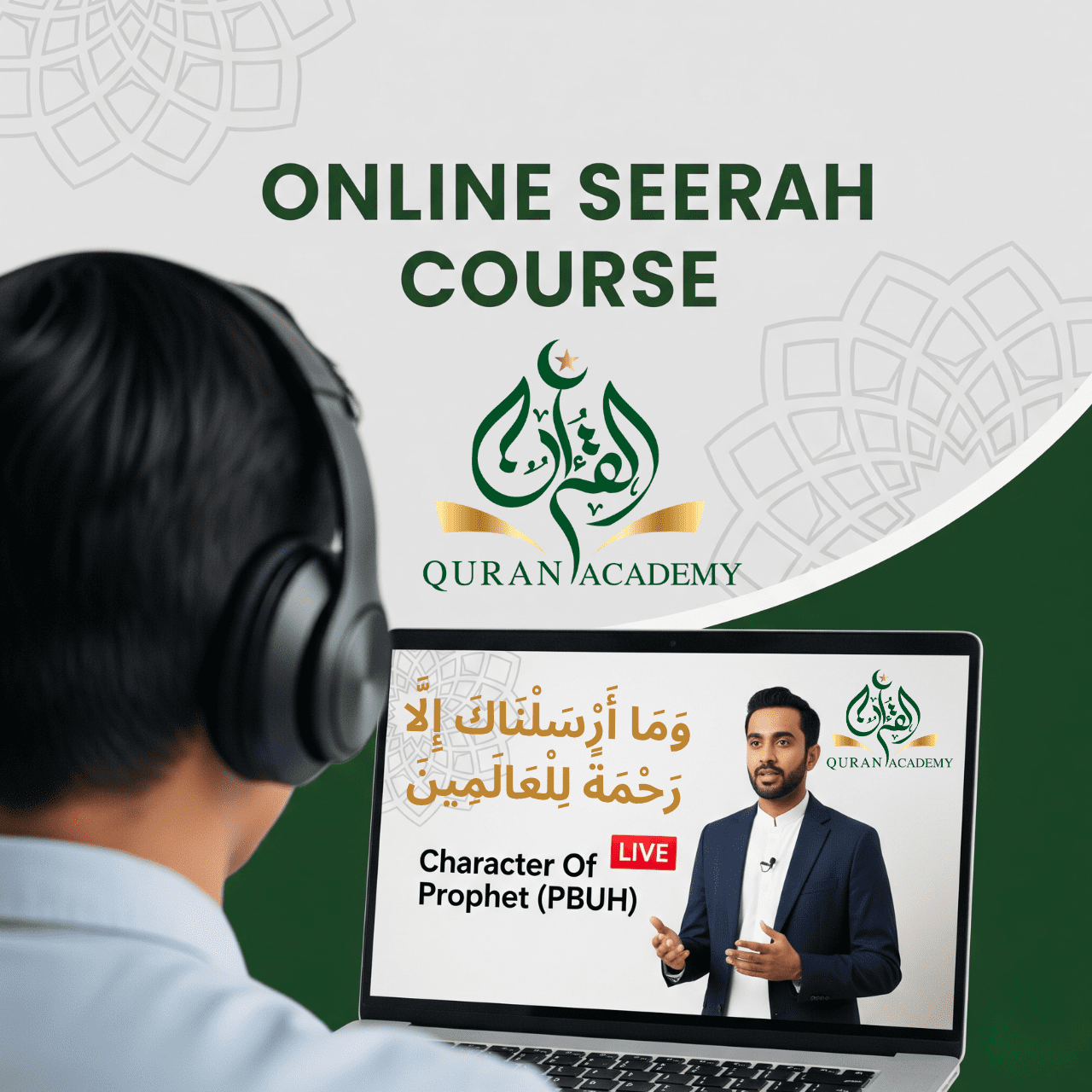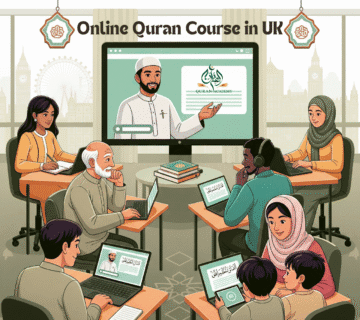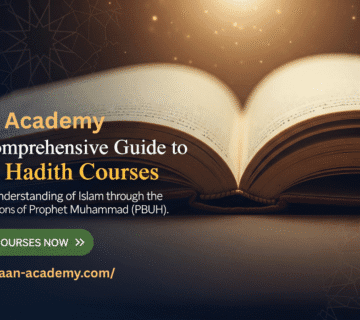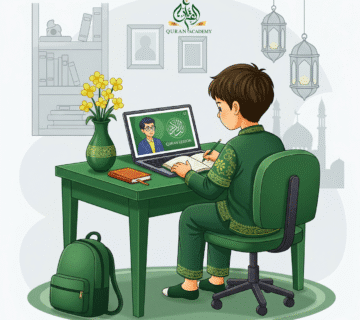An online Seerah course is an educational program that takes you on a journey through the life of Prophet Muhammad (peace be upon him). “Seerah” (سيرة) literally means “path” or “journey” and refers to the biography of the Prophet, covering his life, character, teachings, and the significant events that shaped early Islamic history.
Studying the Seerah is considered highly beneficial for Muslims, as it provides context for understanding the Quran, Hadith, and Islamic law, while also offering practical lessons for daily life and spiritual growth.
What to Expect in an Online Seerah Course Program and Lessons:
Online Seerah courses are often structured chronologically, moving through key periods of the Prophet’s life, and may be divided into levels (beginner, intermediate, advanced) or parts (Makkan Period, Madinan Period).
Here’s a typical program structure and common lessons:
I. Foundations and Pre-Prophethood Era
- Lesson 1: Introduction to Seerah
- What is Seerah and why is it important to study it?
- Benefits of learning the Prophet’s life (deepening love, understanding Islam, practical lessons).
- Reliable sources for Seerah.
- Lesson 2: Pre-Islamic Arabia (Jahiliyyah)
- Geographical, social, political, and religious conditions of the Arabian Peninsula before Islam.
- The state of humanity before the Prophet’s mission.
- Lesson 3: The Noble Lineage and Early Life of the Prophet (PBUH)
- His ancestry and the significance of his lineage.
- His birth, childhood, and upbringing (orphanhood, care by Abdul Muttalib and Abu Talib).
- His characteristics and reputation (Al-Amin, Al-Sadiq) before prophethood.
- His marriage to Khadijah (RA) and family life.
II. The Makkan Period (Before Hijrah)
- Lesson 4: The Revelation Begins
- The first revelation in Cave Hira.
- The early days of Da’wah (calling to Islam) in secret.
- The first converts (Khadijah, Ali, Abu Bakr, Zayd).
- Lesson 5: Public Call and Early Persecution
- The Prophet’s public declaration of Islam.
- The response of the Quraysh and the beginning of persecution.
- Patience and steadfastness of the early Muslims.
- Lesson 6: Migration to Abyssinia (Hijrah to Habasha)
- The reasons for the migration.
- The Muslims’ reception by the Negus (Najashi).
- Lessons from this migration.
- Lesson 7: The Boycott and Year of Sorrow
- The social and economic boycott of the Prophet’s family and companions.
- The deaths of Khadijah (RA) and Abu Talib.
- The journey to Ta’if and its challenges.
- Lesson 8: The Isra’ and Mi’raj (Night Journey and Ascension)
- The miraculous journey to Jerusalem and ascension to the heavens.
- The gift of Salah (prayer).
- Its spiritual significance and lessons.
- Lesson 9: Seeking a New Home
- The Prophet’s interactions with various tribes.
- The pledges of Aqabah (first and second).
- The decision for Hijrah to Madinah.
III. The Madinan Period (After Hijrah)
- Lesson 10: The Hijrah to Madinah
- The strategic planning and miraculous events of the migration.
- The establishment of the first Islamic state in Madinah.
- The building of Masjid an-Nabawi and the brotherhood between Muhajiroon and Ansar.
- The Covenant of Madinah.
- Lesson 11: Early Battles and Defense of Islam
- Battle of Badr: Causes, events, and lessons (divine help, reliance on Allah).
- Battle of Uhud: Challenges, lessons in obedience, patience, and leadership.
- Battle of Khandaq (The Trench): Strategic defense, unity, and resilience.
- Expulsions of Jewish tribes.
- Lesson 12: Treaty of Hudaybiyyah
- Its context, terms, and the wisdom behind it.
- Its long-term impact and opening for future conquests.
- Lesson 13: The Conquest of Makkah (Fath Makkah)
- The events leading to the conquest.
- The Prophet’s mercy and forgiveness upon entering Makkah.
- The cleansing of the Ka’bah.
- Lesson 14: Later Expeditions and Spread of Islam
- Battle of Hunayn, Siege of Ta’if, Expedition to Tabuk.
- Delegations from various tribes accepting Islam.
- Sending letters to kings and rulers.
- Lesson 15: The Farewell Pilgrimage (Hajjat al-Wada’)
- The Prophet’s final Hajj.
- The Farewell Sermon and its universal message.
- Key teachings on rights, justice, and adherence to Quran and Sunnah.
- Lesson 16: The Final Days and Passing of the Prophet (PBUH)
- His illness and final instructions.
- His legacy and the succession of leadership.
IV. Character, Lessons, and Contemporary Relevance
- Lesson 17: The Prophet’s Character and Morals (Shamail)
- His conduct as a husband, father, friend, leader, and judge.
- His compassion, justice, humility, courage, and generosity.
- How to emulate his Sunnah in daily life.
- Lesson 18: Practical Lessons and Wisdom from the Seerah
- Extracting timeless wisdom for modern challenges.
- Leadership, community building, resilience, Da’wah strategies.
- Lesson 19: Connection between Seerah, Quran, and Sunnah
- How the Seerah illuminates the Quranic verses and Hadith.
- The Prophet as the living embodiment of the Quran.
- Lesson 20: Deepening Love for the Prophet (PBUH)
- The importance of loving the Prophet.
- Ways to express and cultivate this love.
Online Course Features You Might Find:
- Recorded video lectures: For self-paced learning.
- Live interactive sessions: Q&A, discussions with instructors.
- Downloadable resources: PDFs of notes, articles, and book excerpts.
- Quizzes and assignments: To test understanding.
- Discussion forums: For peer interaction.
- Certificates of completion.
- Specific tracks: Some courses are tailored for children, teens, new Muslims, or those seeking advanced academic study.
seerah course online – Quran Academy
When you mention “Quran Academy” in the context of a Seerah course, it’s helpful to remember that there are many online platforms with similar names. While many focus primarily on Quran recitation and memorization, most also offer “Islamic Studies” that include Seerah.
Here’s a breakdown of what you can generally expect from a Seerah course offered by a “Quran Academy” or similar online Islamic education platform, based on common offerings:
Common Features and Curriculum:
-
Comprehensive Coverage: Quran Academy offering Seerah will aim to cover the entire life of Prophet Muhammad (PBUH) from birth to passing, typically divided into the Makkan and Madinan periods.
-
Chronological Approach: Lessons usually follow a chronological order to help students understand the progression of events and their context.
-
Key Events and Milestones: You can expect detailed lessons on:
- Pre-Prophethood: The state of Arabia, the Prophet’s lineage, birth, childhood, youth, and early life before revelation.
- Makkan Period: The first revelation, secret and public calls to Islam, early persecution, migration to Abyssinia, the boycott, the Year of Sorrow, Isra and Mi’raj, and the pledges of Aqabah.
- Madinan Period: The Hijrah to Madinah, establishment of the Islamic state, the brotherhood between Muhajiroon and Ansar, major battles (Badr, Uhud, Khandaq), the Treaty of Hudaybiyyah, the Conquest of Makkah, and the Farewell Pilgrimage.
- His Passing: The Prophet’s final days and legacy.
-
Emphasis on Lessons and Wisdom: Beyond mere historical facts, a good Seerah course will emphasize:
- Prophetic Character (Shamail): His excellent morals, leadership, compassion, justice, patience, and wisdom.
- Practical Application: How to derive lessons from the Prophet’s life and apply them to contemporary challenges and personal development (e.g., resilience, dawah strategies, community building, family life).
- Connection to Quran and Sunnah: Understanding how the Seerah provides context for many Quranic verses and Hadith, and how the Prophet was the living embodiment of the Quran.
-
Learning Formats:
- One-on-One Classes: Quran Academy specialize in personalized one-on-one sessions, allowing for tailored learning and direct interaction with an instructor. This is often highlighted as a benefit for deeper understanding.
- Group Classes: Some academies offer structured group classes with a set curriculum.
- Recorded Lectures: Many provide access to pre-recorded video or audio lectures for self-paced learning.
- Live Interactive Sessions: Live Q&A sessions, discussions, and interactive elements are common to enhance engagement.
-
Target Audience:
- Courses are often structured with multiple levels (beginner, intermediate, advanced) or tailored for specific age groups (children, teens, adults, new Muslims) with age-appropriate content and teaching methodologies. For example, children’s courses might use more storytelling and visuals.
-
Instructor Quality: Reputable academies emphasize having qualified and experienced instructors, often graduates from Islamic universities like Al-Azhar, who are fluent in English (and sometimes Arabic for direct textual engagement).
-
Support and Resources:
- Study Materials: Downloadable notes, presentations, and supplementary readings (e.g., excerpts from classic Seerah texts like Ar-Raheeq Al-Makhtum).
- Assessments: Quizzes, assignments, and tests to track progress.
- Certificates of Completion.
- Flexible Scheduling: To accommodate different time zones and student commitments.
- Trial Classes: Many offer free trial classes to help you experience their platform and teaching style before committing.





No comment